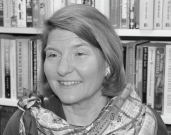“Stop me before I volunteer again” is a popular magnet from a series of photos of well-coiffed, mostly white women from the 1950s juxtaposed with incongruous sayings by Anne Taintor. Perhaps you know a friend or relative who has just taken on one too many tasks, be it coaching the soccer team, delivering meals on wheels, or organizing the next fundraising event. These days we are advised to avoid saying “yes.” Professors without tenure should keep their heads down and execute publications so they can achieve the next level. Women and minorities should avoid being the token member of committees. We should all make sure that we take time to eat with our families and get our required exercise.
Yet, there is a great deal that needs to be done in our schools, neighborhoods, and communities, and will only be done by people who raise their hands, sometimes for remuneration, more often not. Larsen, Millsaps, Harrington, and Lefferd came together for a project that involved geography researchers being in classrooms observing teachers teach and students learn. Anyone who has organized this type of activity knows how complicated that process can be. You have to schedule time in schools around instruction priorities, testing, and unexpected days off. You have to manage the appropriate permissions and protocols. You have to be a good communicator, and remain civil with everyone on the team. And that is before interaction with students comes into play. “Researchers can do their best to develop and test learning progressions in geography; but without teachers as partners and collaborators, the journey is likely to be more challenging. Teachers can serve in a variety of ways, such as offering their expertise on a particular aspect of a project or opening their class to an opportunity to conduct cutting-edge, informative research” (2018, 64). While reading this article, think about how you might share your perspective on learning progressions in geography with an expanded audience.
Mitchell and Hare remind us that it has been fewer than twenty years since students have been taking the Advanced Placement Human Geography (AP HG) exam. Putting that process together took countless volunteers and many meetings. In their article, Mitchell and Hare explore options for professional development for AP HG teachers, many of whom spend their own time and resources to attend trainings and explore new course materials. They emphasize that the field changes quickly, requiring communication among teachers, college-level geographers, and professional development providers to make sure that services offered are as useful as possible.
Online education has become more prevalent both in secondary schools and at higher education institutions. Moving a course to an online format is not a simple process of sharing slides and lecturing online. Instructors have to figure out, sometimes with support, sometimes without, how to make the curriculum and other course elements fit together for students who may be dispersed across multiple time zones. Kopteva “describes specific course modifications completed over the course of a year to provide quality online geography instruction” (2018, 80). She offers suggestions about how to create a vibrant course and guidance through some of the frustrations that can derail communication and learning.
Geographers often volunteer to share their knowledge about maps and spatial analysis with instructors in other disciplines. Hewitt describes an activity in which students use a text with geographic details as the basis for creating a map and undertaking analysis. By thinking about methods to help others enter into discussions about geography, we can “facilitate discussion in their classes about the human and physical landscape and what it represents to their respective discipline” (Hewitt, 2018, 92).
In the previous issue, Guest Editor Jeff Lash volunteered a significant amount of time in designing lesson formats, recruiting authors, overseeing revisions, and learning about the details of putting together a journal issue. The geography education community sends him thanks and offers applause for his investment. His work has led to some change in the format and aims of The Geography Teacher, a process that has been underway for some months. Specific details are available on the Taylor & Francis website (http://tandfonline.com/toc/rget20/current).
Highlights include a shortened page length for non-lesson manuscripts, additional lesson formats so that instructors can choose to share more or less background information, and increased opportunities for special themed issues. Please communicate your thoughts on these and any other matters to me at [email protected].
Think about how you want to spend your time, paid and unpaid. Volunteer as needed. Your community will benefit.
Additional information
Notes on contributors

Rebecca Theobald
Rebecca Theobald earned doctoral and master's degrees in Geography from the University of Colorado at Boulder and a bachelor's degree in Political Science from Middlebury College. As an expatriate parent in Brussels, she was curious about that country's approach to choice in education and examined patterns of parental choice in elementary schools in Colorado Springs. She currently holds an appointment as Assistant Research Professor in the Department of Geography and Environmental Studies at the University of Colorado Colorado Springs, where she coordinates the Colorado Geographic Alliance. Recent research has included exploring the learning impacts of using National Geographic giant state maps to teach mathematics and geography concepts and skills in elementary schools.” She is a member of the Association of American Geographers and the National Council for Geographic Education and a fellow of the Salzburg Seminar.
